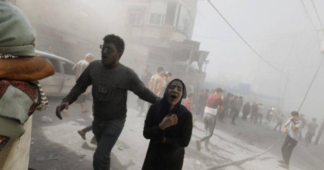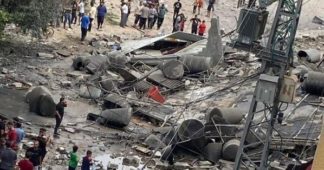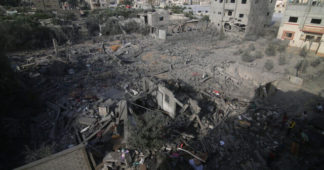By Jessica Buxbaum
Nov 3, 2023
Last weekend, Israeli newspaper Local Call leaked an official Israeli government document recommending what Palestinians have been saying Israel is already trying to execute with its war on Gaza—the forcible transfer of Gaza’s 2.3 million Palestinian population to Egypt’s Sinai Peninsula.
Prime Minister Benjamin Netanyahu’s office acknowledged the Intelligence Ministry’s proposal exists. Still, it dismissed it in a statement to the Times of Israel as a “concept paper, the likes of which are prepared at all levels of the government and its security agencies.”
Yet Israeli actions, circulating information, and international support all signal that this policy on paper is quickly transitioning to the policy on the ground.
From draft policy to reality
The document dated October 13 calls for Israel “to evacuate the [Gazan] civilian population to Sinai” first by establishing tent cities and then building new towns in northern Sinai. Following the resettlement, the paper recommends “to create a sterile zone of several kilometers inside Egypt and not allow the population to return to activity or residence near the Israeli border.”
Netanyahu is already attempting to put this plan into action. Last week, the Israeli prime minister sought to convince European leaders to pressure Egypt into accepting refugees from Gaza, according to the Financial Times. Diplomats from France, Germany, and the UK, however, dismissed the idea, citing Egypt’s strong rejection of the displacement of Palestinians from Gaza.
With that avenue failing, Netanyahu is now reportedly proposing to write off a large chunk of Egypt’s debt through the World Bank to incentivize the country to take in Gaza’s population.
“Everything that has been spelled out in this document in terms of the modalities is everything that we’re seeing right now,” international human rights lawyer Diana Buttu told MintPress News.
The plan’s first phase details Israel’s aerial bombardment of the northern section of the Gaza Strip and the moving of the population of over one million people to the south. The second stage outlines Israel’s ground invasion, beginning in the north and then taking over the whole region.
“Compressing Palestinians to smaller and smaller areas may just be the first of what will ultimately be the fulfillment of these plans on paper,” Adam Shapiro, Israel/Palestine director for rights group Democracy for the Arab World Now (DAWN), told MintPress News.
The controversial Intelligence Ministry document isn’t the only policy paper recommending 2.3 million Gazans’ forcible transfer to Egypt. Israeli security think tank Misgav (or the Institute for National Security and Zionist Strategy) published a paper written by Misgav researcher Amir Weitmann on October 17, entitled, “A plan for resettlement and final rehabilitation in Egypt of the entire population of Gaza: economic aspects.” Weitman is an activist with Netanyahu’s Likud Party and reportedly a close associate of Intelligence Minister Gila Gamliel.
The report calls for “Israel… [to] transfer as many Gazans as possible to other countries; Any other alternative, including PA rule, is a strategic failure. Therefore, Gaza’s population should be transferred to the Sinai Desert and the displaced absorbed in other countries.”
Misgav published the paper on X (formerly known as Twitter) along with a tweet outlining the paper’s central arguments. The post was deleted following widespread backlash.
The original tweet read:
There is currently a unique and rare opportunity to evacuate [sic] the entire Gaza Strip in coordination with the Egyptian government. An immediate, realistic and sustainable plan for the resettlement and humanitarian rehabilitation of the entire Arab population in the Gaza Strip is required which aligns well with the economic and geopolitical interests of Israel, Egypt, the USA and Saudi Arabia.
- In 2017, it was reported that there are about 10 million vacant housing units in Egypt, of which about half are built and half are under construction. For example, in the two largest satellite cities of Cairo…there is a huge amount of built and empty apartments owned by the government and private parties, and construction areas sufficient to house about 6 million inhabitants.
- The average cost of a 3-room apartment with an area of 95 square meters for an average Gazan family consisting of 5.14 people in one of the two cities indicated above is about $19,000. Taking into account the currently known size of the entire population living in the Gaza Strip, which ranges from about 1.4 For approximately 2.2 million people, one can estimate that the total amount required and to be transferred to Egypt to finance the project, will be on the order of $5-8 billion.
- Injecting an immediate stimulus of such size into the Egyptian economy would provide a tremendous and immediate benefit to al-Sisi’s regime. These sums, in relation to the Israeli economy, are minimal. Investing a few billion dollars (even if it is $20- or $30-billion) to solve this difficult issue is an innovative, cheap and sustainable solution.
- There is no doubt that in order for this plan to be realized, many conditions must exist concurrently. Currently, these conditions are optimal, and it is unclear when another such an opportunity will arise, if ever.
Misgav subsequently published another paper related to Gaza entitled Hamas Enjoys Widespread Support Among Gaza’s Population, written by Misgav fellow Yishai Armoni on October 19.
In this essay, Armoni details the considerable support Hamas enjoys from its constituents, writing:
Despite claims now being made that the majority of the public in Gaza desires peace and is being held captive by Hamas, data and evidence collected over the past two decades consistently demonstrates the opposite. Hamas enjoys widespread support among Gaza’s civilian population.
The paper then concludes “that claims regarding the existence of a clear ideological or political demarcation between the majority of Gaza’s residents and Hamas are entirely unfounded.”
While Armoni makes clear not to conflate civilians with Hamas militants, he does note that Hamas’ popularity among Gaza’s residents should be taken into account with “regards to decisions related to the military campaign, and to post-war arrangements in the Gaza Strip.”
The Misgav Institute did not respond to MintPress News’ requests for comment on these position papers.
Israeli legal advisor Itay Epshtain explained on social media how the views outlined in Misgav’s recent documents are already translating into action.
From the people that orchestrated #Israel annexation of the West Bank and the ancillary "judicial overhaul" come these two position papers, which will likely determine the position on #Gaza. Premeditated grave breaches of international law in two steps: pic.twitter.com/gM6ZG1DnGd
— Itay Epshtain (@EpshtainItay) October 25, 2023
According to leaflets airdropped on northern Gaza from the Israeli military, anyone who doesn’t leave for the south could be considered affiliated with Hamas.
Furthermore, Misgav’s executives already appear integral in crafting government legislation. Misgav is headed by former Netanyahu National Security Advisor Meir Ben Shabbat, an influential figure in the Israeli security sphere and one of the architects of Israel’s normalization deals with the UAE, Bahrain, and Morocco. Misgav is also funded by Kohelet Policy Forum, now notorious for being behind the current Israeli government’s judicial overhaul plans.
The Institute’s founders and former chairs are also entwined with the Israeli government. Former chairman Yoaz Hendel served as Israel’s Minister of Communications. Moshe Yaalon served as Defense Minister under Netanyahu. Moshe Arens also worked as Israel’s Defense Minister and Foreign Affairs Minister. Natan Sharansky served as Interior Minister and as Deputy Prime Minister.
The US is complicit
One of the critical points in the Intelligence Ministry’s document stressed the need for harnessing international support for the expulsion plan—something analysts argue Israel’s Western allies are already doing.
On October 20, the White House sent a $14 billion funding request to Congress for aid to Israel, Gaza, and Ukraine. The letter’s language has come under scrutiny for suggesting the forcible displacement of Gazans to other countries.
The letter reads:
These resources would support displaced and conflict affected civilians, including Palestinian refugees in Gaza and the West Bank, and to address potential needs of Gazans fleeing to neighboring countries… This crisis could well result in displacement across [the] border and higher regional humanitarian needs, and funding may be used to meet evolving programming requirements outside of Gaza.
DAWN slammed the White House request’s language and called on Congress to reject the supplementary funding bill.
“The Biden administration isn’t just giving a green light for ethnic cleansing—it’s bankrolling it,” Sarah Leah Whitson, DAWN’s executive director, said in a statement. “Gaslighting Americans into facilitating long-held Israeli plans to depopulate Gaza under the cover of ‘humanitarian aid’ is a cruel and grotesque hoax.”
While the White House request acknowledged the possibility of Gazans being expelled during the war, US President Joe Biden has previously advocated against this forcible displacement. The White House did not respond to MintPress News’ inquiries for comment on the aid bill.
“The Americans are supporting Israel and creating the conditions on the ground that are catastrophic from a humanitarian perspective,” DAWN’s Shapiro told MintPress News.
So far, the US has repeatedly rejected calls for a ceasefire in Israel’s war on Gaza. However, Biden recently advocated for a “pause” to secure the release of American captives held by Hamas. The US has also sent senior army officials to advise Israel’s military on its ground invasion into Gaza and increased its arms and troops in the Middle East and Eastern Mediterranean regions. This has included shipments of armored jeeps and advanced weaponry to Israel
משרד הביטחון קלט לפני שעה קלה בישראל מטוס מטען אמריקני עם משלוח ראשון של ג'יפים ממוגנים לצה״ל. הג'יפים מועברים בשעה זו לצה"ל כדי להחליף כלי רכב שנפגעו במלחמה.
להמשך קריאה: https://t.co/IYPTj2lkyZ pic.twitter.com/szUOJzzvvu
— משרד הביטחון (@MoDIsrael) October 19, 2023
מזכיר ההגנה האמריקני, לויד אוסטין, מלווה בידי מנכ"ל משרד הביטחון, אלוף (מיל') אייל זמיר וסגן הרמטכ"ל, אלוף אמיר ברעם, קיבלו לפני זמן קצר בבסיס נבטים של חיל האוויר מטוס מטען אמריקני ראשון, שנחת בישראל מאז פרוץ המלחמה, עם משלוח של חימושים עבור צה"ל.
להמשך>> https://t.co/IYPTj2lkyZ pic.twitter.com/4rgv0u6MuD— משרד הביטחון (@MoDIsrael) October 13, 2023
משרד הביטחון מפרסם תיעוד מנחיתת מטוס המטען, שהביא לישראל משלוח ראשון של חימושים מתקדמים.
הציוד נרכש והובא לישראל במבצע משותף למנהל הרכש (מנה"ר), משלחת הרכש של משרד הביטחון בארה"ב ויחידת הממונה על השינוע הבינלאומי, אשר גייסה את מטוס המטען, שהביא את החימושים בטיסה ישירה מארה"ב. pic.twitter.com/xZodTxX41y— משרד הביטחון (@MoDIsrael) October 11, 2023
Footage circulating online has also shown US-manufactured weapons containing white phosphorus being used in Israel’s assault on Gaza. These artillery shells were made by Pine Bluff Arsenal, a chemical weapons manufacturer based in Arkansas known for supplying white phosphorus ammunition.
Barak Mayer "To all those who doubted
when I wrote that Israel uses white phosphorus
in Gaza: this is a shell of white phosphorus
(M825A1, made by Pine Bluff Arsenal, USA)"[The IDF has claimed it uses white phosphorus
in Gaza not as a weapon, but for illumination/as marker] https://t.co/haiiGwNVbL— Marian Houk (@Marianhouk) October 30, 2023
תיקון ועדכון חשוב:
קיבלתי מידע שפגזי הזרחן הלבן מסומנים בפס צהוב או אדום ולא חום כמו בתמונה. אני חושב שהמידע מדוייק, אבל מאחר ויש תמונות שפורסמו מהמערכה הנוכחית (צולמו ב-9.10), עם הפגזים המדוברים, המסומנים בפס צהוב, אשאיר את הציוץ עם ההבהרה.https://t.co/KIcvRzi6X7 pic.twitter.com/rHCDipGSkR— Barak Mayer (@ireallyhateyou) October 30, 2023
“The majority of the world is opposed to this attack on Gaza,” Buttu said. “But still, Western Europe, the United States, and Canada are not.”
Buttu described the US as “totally complicit” in Israel’s displacement of Palestinians in Gaza, saying, “This is an Israeli plan that will be signed off on by the Americans, by the Canadians, by Europe, and so on.”
Israeli policy papers promoting the ethnic cleansing of Gaza simply mirror what many Israeli politicians and media pundits have expressed since the beginning of this war.
A member of Israel’s parliament, Ariel Kallner, called for repeating the ethnic cleansing of Palestinians during Israel’s establishment as a state in 1948, known as the Nakba or ‘catastrophe’ in Arabic, except on a much larger scale.
“Right now, one goal: Nakba! A Nakba that will overshadow the Nakba of 1948,” Kallner wrote on X.
Dror Eydar, Israel’s former ambassador to Italy, called for the complete destruction of Gaza during a live interview with Italian channel Rete 4.
“For us, there is a purpose: to destroy Gaza, to destroy the absolute evil,” he said.
As Israel continues carpet-bombing Gaza and as even a sliver of humanitarian aid struggles to trickle into the besieged enclave, another Nakba—or arguably just another chapter in this genocidal series—is rapidly being carried out.
“This has just been a continuation since ‘48,” Buttu said. “It’s just this slow drip to get people to leave and, in some cases, not a slow drip, but even a faster one.”
Jessica Buxbaum is a Jerusalem-based journalist for MintPress News covering Palestine, Israel, and Syria. Her work has been featured in Middle East Eye, The New Arab, and Gulf News.
We remind our readers that publication of articles on our site does not mean that we agree with what is written. Our policy is to publish anything which we consider of interest, so as to assist our readers in forming their opinions. Sometimes we even publish articles with which we totally disagree, since we believe it is important for our readers to be informed on as wide a spectrum of views as possible.











